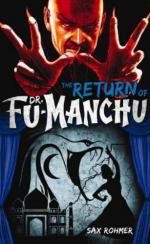“It seems like forcing our company upon you,” he said, “but in your own interests I think it will be best to do as you are good enough to suggest. I hope and believe that our arrival here has not been noticed by the enemy; therefore it will be well if we remain concealed as much as possible for the present, until we have settled upon some plan.”
“Hagar shall go to the station for your baggage,” said the American rapidly, and clapped his hands, his usual signal to the mulatto.
Whilst the latter was receiving his orders I noticed Nayland Smith watching him closely; and when he had departed:
“How long has that man been in your service?” snapped my friend.
Van Roon peered blindly through his smoked glasses.
“For some years,” he replied; “he was with me in India—and in China.”
“Where did you engage him?”
“Actually, in St. Kitts.”
“H’m,” muttered Smith, and automatically he took out and began to fill his pipe.
“I can offer you no company but my own, gentlemen,” continued Van Roon, “but unless it interferes with your plans, you may find the surrounding district of interest and worthy of inspection, between now and dinner time. By the way, I think I can promise you quite a satisfactory meal, for Hagar is a model chef.”
“A walk would be enjoyable,” said Smith, “but dangerous.”
“Ah! perhaps you are right. Evidently you apprehend some attempt upon me?”
“At any moment!”
“To one in my crippled condition, an alarming outlook! However, I place myself unreservedly in your hands. But really, you must not leave this interesting district before you have made the acquaintance of some of its historical spots. To me, steeped as I am in what I may term the lore of the odd, it is a veritable wonderland, almost as interesting, in its way, as the caves and jungles of Hindustan depicted by Madame Blavatsky.”
His high-pitched voice, with a certain labored intonation, not quite so characteristically American as was his accent, rose even higher; he spoke with the fire of the enthusiast.
“When I learned that Cragmire Tower was vacant,” he continued, “I leaped at the chance (excuse the metaphor, from a lame man!). This is a ghost hunter’s paradise. The tower itself is of unknown origin, though probably Phoenician, and the house traditionally sheltered Dr. Macleod, the necromancer, after his flight from the persecution of James of Scotland. Then, to add to its interest, it borders on Sedgemoor, the scene of the bloody battle during the Monmouth rising, whereat a thousand were slain on the field. It is a local legend that the unhappy Duke and his staff may be seen, on stormy nights, crossing the path which skirts the mire, after which this building is named, with flaming torches held aloft.”
“Merely marsh-lights, I take it?” interjected Smith, gripping his pipe hard between his teeth.




